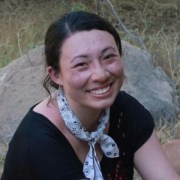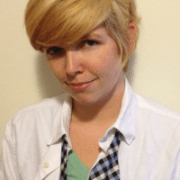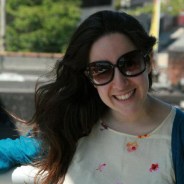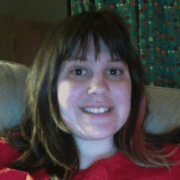LAURA M.:
 Growing up, my family and I were practicing Roman Catholics. We went to church together every Saturday night, and I participated in the mass as an altar server or a eucharistic minister. I also attended a private Catholic school for eight years. Towards the end of high school I went through confirmation — basically, a formal, public declaration that I accepted the beliefs of the Catholic church and wanted to participate as an adult.
Growing up, my family and I were practicing Roman Catholics. We went to church together every Saturday night, and I participated in the mass as an altar server or a eucharistic minister. I also attended a private Catholic school for eight years. Towards the end of high school I went through confirmation — basically, a formal, public declaration that I accepted the beliefs of the Catholic church and wanted to participate as an adult.
It was around this time that the Catholic priest sex abuse scandal broke. As the national headlines hit one after another, my neighbors whispered secondhand stories about about a local priest, “Chester the molester.” I watched as the Church scrambled to hide, deny, and generally cover up any evidence of wrongdoing. It was horrifying. As the stories continued to roll out (and the Church continued to present its lackluster non-response), I really started questioning the politics of the Church. The more I looked into the church’s stance on issues that I cared about (birth control, women’s roles, modern science), the more backwards the Church seemed to me.
“The more I looked into the church’s stance on issues that I cared about, the more backwards the Church seemed to me.”
Today, I refer to myself as a lapsed Catholic. I’m totally on board with the basic moral teachings of the Church (“love thy neighbor as thyself”; “turn the other cheek”), and I love the stories of the gospel. But when Church leaders are telling AIDS-stricken countries that it’s immoral for them to wear condoms, I just can’t bring myself to be a part of that. I’m really encouraged by the statements that Pope Francis has been making lately, but without a massive structural change and an overhaul on official doctrine, I don’t see myself participating in institutionalized Catholicism. For now, I’ll just be watching that mess from the sidelines.
I stopped going to church a year or two before realizing I was queer, so there was never a big “coming out” to my congregation or anything like that. My girlfriend was (coincidentally) also raised Catholic, but she stopped going to church in college too. My family has never had a problem with my orientation, and they actually stopped going to church a few years ago in support of the feminist American nuns. So queerness-related conflict with practicing Catholics has pretty much been a non-issue for me.
HANSEN:
 I was raised casually Methodist, meaning we went to church and I really liked Sunday School, especially the song about the Devil sitting on a tack and the times I got to make stuff to hang on the fridge. I never worried about religion as a kid, it was just accepted. You accept these things as a kid so much easier than as an adult.
I was raised casually Methodist, meaning we went to church and I really liked Sunday School, especially the song about the Devil sitting on a tack and the times I got to make stuff to hang on the fridge. I never worried about religion as a kid, it was just accepted. You accept these things as a kid so much easier than as an adult.
After my parents divorced when I was 7, we stopped going to the Methodist church. I started to realize I might be queer when I was about 14. I didn’t really act on it, but sometimes I held hands with this girl and it made me happy.
When I was 15, my best friend invited me to go with her to church, which turned out to be a Mormon church. The people were so nice there and welcoming that I just kept going. I even went to seminary every morning at 6am, which is kind of like a Bible study, but at 6am. I knew I had to leave the Mormon church when I was at my grandmother’s funeral. I just had this overwhelming feeling that I was in the wrong place spiritually and the LDS faith wasn’t right for me.
After that, my friends and I started going to Youth Group at a biker church called Set Free. Like motorcycle church. Like Harley-enthusiasts revvin’ their engines for Jesus. I made some great friends there and realized Christians could have snakebite piercings and dye their hair black and wear studded belts and be really fucking cool. Eventually my friends and I left Set Free after some problems with its pastoral leadership. We began going to Blue Sky. It was a hip church with couches and candles and I felt really comfortable there. Everyone looked like they had just walked out of a Diesel ad. They accepted us very quickly, and I got super involved with Bible studies and hangouts and volunteering in the nursery.
“My faith fluctuates a lot now, some days I’ll feel pretty Athiest, some days Agnostic, but most of the time I feel pretty sure I’m in the right place as a quiet and personal Christian.”
Another huge part of my faith was the Christian alternative music scene. Does that sound silly? It was. My friends and I really connected with religion through bands like Emery, Anberlin, mewithoutYou, the Chariot, Blindside, and so many others. It was so hip to be Christian, you guys!
I started dating my first serious girlfriend right after high school, and when I came out to my best friend at the time and asked her not to tell anyone, well, I bet everyone can guess how that went. She seemed supportive, but then wrote me a letter about how she doesn’t want me to lead a life of sin and quoted a bunch of Bible verses. My friends began to stage interventions in their living rooms about how homosexuality is just a burden that I needed to bear and how marrying a man would cure me and a lot of terrible things. I was really disheartened about religion at this point.
So I quit the Diesel-ad church, but began going to a Lutheran college to be closer to my girlfriend in New York. The Lutheran college was actually full of lesbians and bisexual women and queers of all shapes and sizes. It was amazing. I was only harassed for my first semester, but even the administration protected me in those instances. I attended chapel regularly and reconnected with my faith. Because I’m not Lutheran, I began to accept that I can worship in church and still be doing my own thing spiritually.
I now sometimes attend a church in my town called Timberline, which I’ve been going to off and on since I was 16 with my family, mostly for holidays. It’s a non-denominational Bible-based teaching church, but I like the huge size of it, to be honest. I am anonymous there. I am able to worship privately enough for my own tastes, but I am still given a community in which to grow in my understanding of my spirituality. It allows me to have a more intimate and personal relationship with my faith, which is how I feel most comfortable associating myself with the Christian religion being a queer person. My faith fluctuates a lot now, some days I’ll feel pretty Athiest, some days Agnostic, but most of the time I feel pretty sure I’m in the right place as a quiet and personal Christian.
VANESSA:
 My queer identity and my Jewish identity are both very important to me, and I’m lucky enough that for now, they haven’t clashed – at least not much.
My queer identity and my Jewish identity are both very important to me, and I’m lucky enough that for now, they haven’t clashed – at least not much.
I was raised in North America by two South African Jewish parents, which is a very specific identity that would require its own 1000+ word essay to even begin to explain, and from the time I was small I was taught that Judaism is about tradition. Though my family was not particularly attached to the idea of Judaism as a spiritual practice – my dad didn’t go to synagogue for a long time, though he has started going regularly since his parents passed away over the past couple of years, and as my brother and I have gotten older my mom has stopped insisting we go to synagogue even on the High Holy Days, which used to be non-negotiable – we are definitely steeped in the tradition, and from the Friday night Shabbat dinners that we’ve had literally every single week for my entire life (candle lighting, wine, challah, and a few prayers at the beginning of the meal included) to the assumption that I would obviously have a Bat Mitzvah to my father’s reaction when I came out as queer (“Well, as long as she’s Jewish that’s okay with me!”), it has always been clear to me that being Jewish means something, to my parents and to my family and even to myself, even if I’m not always totally sure what that something is, exactly.
So the thing about mixing my Jewishness and my queerness is that while I have always known I was Jewish – when I was younger and went to Jewish Day School my teachers taught us that Jews make up less than 1% of the world and I didn’t believe them, because every single person I knew was Jewish so my tiny human brain was sure that statistic could not be right – I definitely did not always know I was queer. I discovered that piece of myself when I was 19, and I’ve been learning and growing and expanding on that identity ever since. And while it may seem to make sense to want to mix these two identities together – there are plenty of places to queer Judaism, and plenty of queer Jews, particularly on college campuses, especially if that college is NYU and the “campus” is downtown New York City – it isn’t really a thing I’ve sought to do. I kind of like my Judaism and my queerness separate, if that makes sense. Or, I like to have both, but I don’t need them to be interacting at all times. I have some queer friends who felt the need to check in with their rabbis after they came out, but that never occurred to me. I suppose I’ll have to address some of these issues in the future: if I want to get married in a synagogue I’ll have to make sure the rabbi I choose is okay with same sex marriage, and if I decide to have babies and raise my kids Jewish I’ll want them growing up in an accepting environment. I know my dad thinks it’s important that I marry a Jewish person but he doesn’t care if they were born Jewish or if they convert, but frankly I don’t know if I care at all. That’s what a lot of my feelings about being queer and being Jewish (and really just being, period) boil down to: I don’t know. I’m still trying to figure it out personally. I don’t have to speak for Jews, or for Queers, or for All Queer Jews… I just have to speak for myself.
“I kind of like my Judaism and my queerness separate, if that makes sense. Or, I like to have both, but I don’t need them to be interacting at all times.”
If Judaism is about tradition, then my own personal traditions in the Jewish sphere have nothing to do with my sexuality. I’ve tried going to LGBT-specific synagogues, but they are mostly Reform or Reconstructionist, and as I grew up mostly Conservative, the services don’t resonate with me – the tunes are unfamiliar and the order of events doesn’t always match what I expect to find at synagogue. Going to pray doesn’t really speak to me at the best of times – I find writing in my journal or going on a long walk to be far more meaningful spiritual practices than sitting in an uncomfortable chair reciting words in a language I don’t speak (Hebrew) while counting hats a la Judy Blume’s Margaret (of Are You There God?) – but when I do get the urge to revisit the familiar, I want it to be… familiar. I’ve attended really lovely queer seders, queer Purim parties, and queer Jewish weddings, and I don’t dislike any of them. But it’s not what I feel I need, when I think of my religion. My Judaism is just sort of a part of me, whether I try to explicitly “queer it” or not. It’s being queered simply by virtue of me practicing it… right?
Because I am queer. And I am Jewish. So no matter what I do, I’m a queer Jew. And I’m okay with that.
ROSE:
 I’m not a religious person – I’ve been an agnostic since I was first old enough to have my own opinions – but I do have a life where I often have to interact with religion. The reason for this is: I am a pastor’s kid.
I’m not a religious person – I’ve been an agnostic since I was first old enough to have my own opinions – but I do have a life where I often have to interact with religion. The reason for this is: I am a pastor’s kid.
The stereotype of “PKs” is that we fall to two extremes: perfect saints or rebellious sinners. Either we’re fanatically devout role models for the rest of the congregation, or we’re hellions partying into oblivion and rejecting everything our parents taught us. I’m neither, though, and a lot of that is because the pastor in my family, my stepdad, is an open-minded, liberal Presbyterian who has always been completely accepting of both my lack of religion and my sexuality. He and my mom were among the first people to teach me that homophobia was wrong, back when everyone else in my conservative hometown was trying to convince me otherwise, and they were both accepting when I eventually came out as bisexual. They also defended my right to my own religious convictions when my bio dad wanted to force me to get confirmed.
“I’m not the sort of non-believer who has a condescending, negative view of religion; if anything, growing up in the church has taught me that religion has as much potential for creating good as evil.”
Regardless, I have a feeling some of our more conservative congregations over the years might have slid me into the “sinner” category if they’d known the truth about me. My parents never encouraged me to hide my sexuality from the church, and my stepdad would do whatever he could within his power to preach tolerance and encourage pro-LGBT attitudes within his churches. Certainly, my parents weren’t shy about the fact that they were pro-gay feminists who voted Democratic. Yet, personally, I often felt like the people there wouldn’t have accepted me if they’d had to face my bisexuality head-on, and frustrated over the difference a hypothetical boyfriend vs. a girlfriend’s appearance at church would make. My stepdad did everything he could, but in some of these extremely white, rural, heavily-Republican congregations… you can’t build Rome in a day, and you can’t wipe out deep-seated prejudice with one sermon.
It is refreshing, at least, that my lack of religious belief, as the daughter of a cleric, would ultimately have been more scandalous than the fact that I date other women. One’s religious beliefs or lack thereof, at least when compared to sexuality, truly are a choice – and so intensely personal that I rarely feel the need to share them even when I’m at church. I’m not the sort of non-believer who has a condescending, negative view of religion; if anything, growing up in the church has taught me that religion has as much potential for creating good as evil. Unless specifically pressed, I see no reason to flaunt the fact that I’m an agnostic. I agree with many of the philosophical principles of Christianity and Jesus’s teachings, and if we can find common ground there, I fail to see why it’s so important that we disagree on theology. What the different religions have in common is where they have the most potential for greatness, after all.







